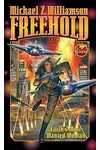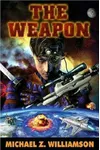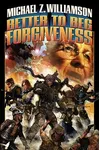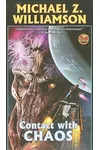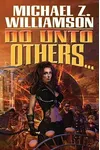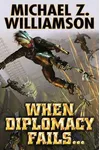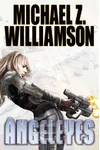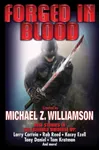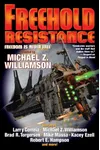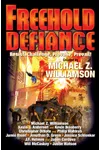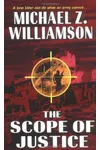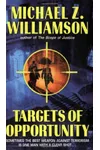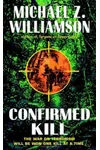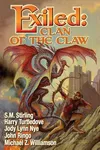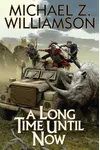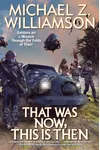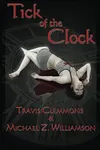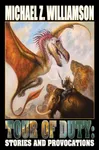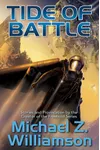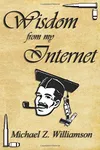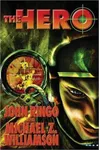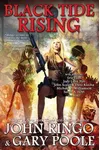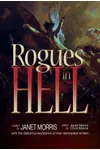Picture a British-born storyteller who swapped military life for crafting gripping sci-fi sagas—meet Michael Z. Williamson! Known for his action-packed Freehold Universe, Williamson blends his U.S. Air Force experience with libertarian ideals to create worlds where freedom fights against tyranny. His debut novel, Freehold, launched a career that’s thrilled military sci-fi fans for decades.
With a knack for strong characters and societal commentary, Williamson’s stories aren’t just about laser battles—they explore what it means to live free in a universe of control. Let’s dive into the life and works of this dynamic author whose pen is as sharp as his combat skills!
The Making of Michael Z. Williamson
Born in 1967 in Birkenhead, England, Michael Z. Williamson’s journey took him from Liverpool to Toronto, Canada, before landing in the United States in 1978. After graduating high school in Newark, Ohio, he enlisted in the U.S. Air Force, serving 25 years across the Air Force, Army, and National Guard. Deployments in Operation Iraqi Freedom and Operation Desert Fox shaped his understanding of military life, fueling the authenticity of his writing.
Williamson’s shift to writing began with a passion for storytelling, inspired by sci-fi giants like Robert Heinlein. In 2004, he burst onto the scene with Freehold, a novel that channeled his experiences as an immigrant and soldier into a tale of rebellion and resilience. His military background and competitive shooting skills added grit to his prose, earning him a loyal readership.
Michael Z. Williamson’s Unforgettable Stories
Williamson’s Freehold Universe is the heart of his bibliography, a sprawling series that explores libertarian societies battling authoritarian forces. Freehold (2004) introduces Kendra Pacelli, a soldier framed for a crime, who flees Earth’s oppressive United Nations to the ultra-libertarian planet Grainne. Critics like Michael M. Jones praised its believable world-building, though some, like Don D’Ammassa, found its politics heavy-handed. The novel hit #3 on the Locus Bestsellers list, cementing Williamson’s place in sci-fi.
Other standouts include The Weapon (2005), a prequel exploring covert operations in the Freehold Universe, and Rogue (2011), which follows operative Kenneth Chiran’s transformation into a deadly warrior. Outside the series, The Hero (2004), co-written with John Ringo, blends high-stakes action with alien encounters, earning Locus Bestseller status. Williamson’s time-travel tale, A Long Time Until Now (2014), showcases his versatility, tossing soldiers into Earth’s Paleolithic past.
His style is gritty yet thoughtful, blending detailed military strategy with societal critiques. Williamson’s works echo Heinlein’s libertarian streak, with strong female protagonists and a focus on individual freedom. Anthologies like Forged in Blood (2017) and Freehold: Resistance (2019) expand his universe through collaborations with authors like Larry Correia, proving his influence in the genre.
Why Michael Z. Williamson Matters
Williamson’s impact lies in his ability to make military sci-fi accessible and thought-provoking. His authentic portrayal of soldiers—drawn from 25 years of service—resonates with readers who crave realism in their sci-fi. By tackling themes like government overreach and personal liberty, he sparks conversations about society’s future, earning comparisons to David Weber for his strategic depth.
His collaborations with bestselling authors and contributions to anthologies have broadened his reach, while his work as a Survivalblog editor and firearms consultant keeps him grounded in real-world issues. Fans adore his unapologetic voice, with some calling Freehold a modern Heinlein classic, making Williamson a vital voice in contemporary sci-fi.
- Born: 1967, Birkenhead, England
- Key Works: Freehold, The Weapon, The Hero, A Long Time Until Now
- Notable: 25 years in U.S. military; state-ranked competitive shooter
Ready to join the fight for freedom? Grab Freehold and dive into Michael Z. Williamson’s thrilling sci-fi universe!
